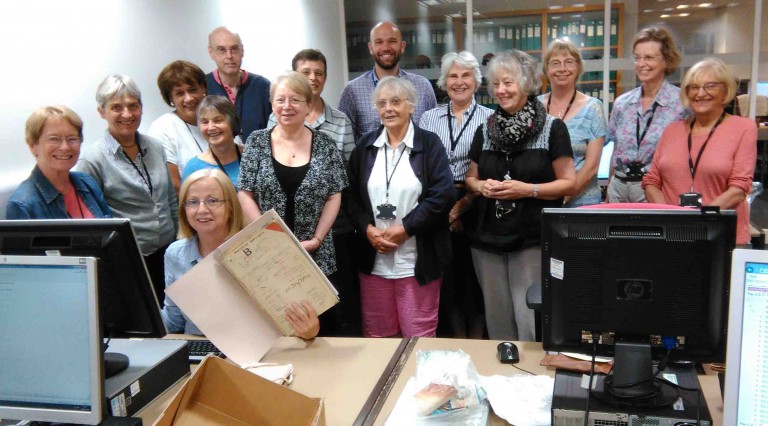Volunteering can play a vital role in many people’s lives, from young people who need experience to get their careers started to those making the move from work to retirement. And it also improves the work of many organisations.
The National Archives continues to benefit from the dedication and commitment of volunteers from across the world through a number of onsite and online projects. Some of these projects came to fruition in 2016 or reached key milestones. This blog examines some of those successes but also looks at how we engage with volunteers in the future to help us continue to achieve our goals through our vision of Archives Inspire.
Many of our volunteers are involved in collection enhancement initiatives, such as adding content to Discovery, our online catalogue. This can involve adding new descriptions or enhancing existing ones.
One such project which ended last year saw the re-cataloguing of some 220,000 First World War Officers personnel files held at Kew in the record series WO 339 and WO 374. Prior to the work, the records were arranged by surname and first initial only, making it difficult to distinguish between the several hundred J Smiths. Now, the collections have been expanded to record full name, rank and regiment, which has enabled us to focus, celebrate and commemorate colourful and moving stories among the collections, including papers relating to Ralph Vaughan-Williams, Basil Rathbone, Claude Raines and TE Lawrence, Ronald Coleman and Walter Tull, the first black officer in the British Army at a time when the manual of Military Law forbade non-Europeans from becoming combat officers. The blogs Give Leadership and Name, the Hollywood battalion, and Walter Tull: from a cobbler to a soldier explore these collections in greater detail demonstrating how the work of the volunteers has vastly improved access and understanding of these records.

Some of our onsite cataloguing volunteers
But our volunteering activity is not solely focused on cataloguing. We also have volunteers who help us maintain our library collection and promote our museum, the Keeper’s Gallery, by providing tours to the public. Volunteers help prepare our records for collection care work prior to digitisation, as well as supporting the conservation treatment and rehousing of collections as Jacquie Moon’s blog Eight million photographs explains.
Remotely, using crowd-sourcing sites, we have collaborated with other institutions such as the National Maritime Museum (NMM) and the Crew List Index Project (CLIP) to create a full transcription by name to the Crew Lists and Agreements from the Merchant Navy for 1915. Building on this success, we have again joined forces with NMM and CLIP to create a new free-to-search database resource relating to all the Royal Navy officers and ratings that served in the First World War – Royal Navy First World War Lives at Sea – based principally on service records held by The National Archives. We were delighted to be nominated and shortlisted for this project at the Maritime Media Awards in 2016. This resulted in us being awarded a certificate of merit, especially remarkable as the project has only been going for a few months; the nomination and certificate are a wonderful accolade to the work achieved so far by volunteers and the potential of the project as it progresses.
It is vital we at The National Archives ensure volunteers feel valued, as they continue to give their time, energy, enthusiasm and expertise to help us continue to provide services in the future. To bring focus to this work, we have a User Participation Board which meets monthly and oversees a growing number of new and diverse ways in which volunteers can support the work of The National Archives, as well as ensuring they are effectively supervised and that their voices are heard. Anne Ramon is the current representative for volunteers on the Board where she can openly discuss any issues of concern raised by volunteers, ask questions about current and any future Projects and provide feedback from volunteers on issues raised by the Board. Anne also meets Caroline Ottaway-Searle, our Director of Public Engagement, on a monthly basis for wider updates on volunteering and The National Archives.
We also work closely with the Archives Sector seeking to deliver best practice through our association with the Archives and Records Association – Volunteering in Archives and Volunteering England. A2A is committed to providing a voice for volunteers within the archive sector and encouraging the diversification of volunteering opportunities. Volunteers provide much needed ‘added value’ support for archives by helping, for example, to enhance access and improve the preservation of collections. They also help strengthen links with local communities and offer effective learning and networking opportunities. The use of volunteers has also to be seen within the wider context of providing effective, efficient and sustainable services and as a critical, but not the sole, building block for delivering such services.
That said, changes in how people work – and how long they work for – will impact volunteering going forward. The number of volunteers engaged in activities across the UK could dwindle as people stay longer in paid employment, for a number of reasons (like changes to default retirement age). Other opportunities and challenges facing volunteers at a national level in 2017 are discussed on the NCVO website.
Further information about volunteering at the National Archives is available on our website, whether you are interested in volunteering in the future here or elsewhere or just keen to learn more about our approach to volunteering and our future plans. We currently have about 120 onsite volunteers and over 300 working on over 20 separate onsite and remote projects. Unfortunately at the moment, we don’t have any vacancies for new volunteers but this may change in the future as we strive to expand our range of volunteer opportunities.
